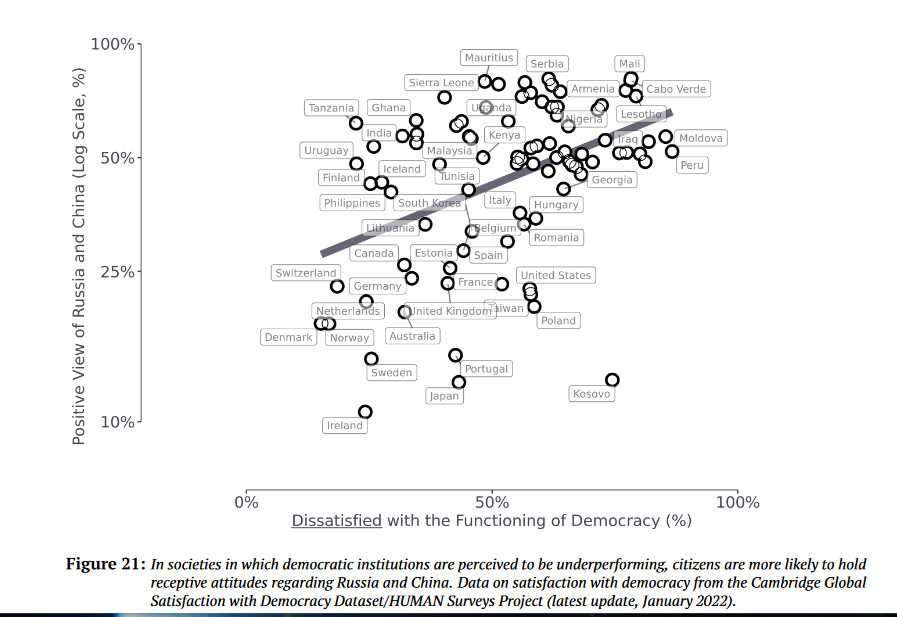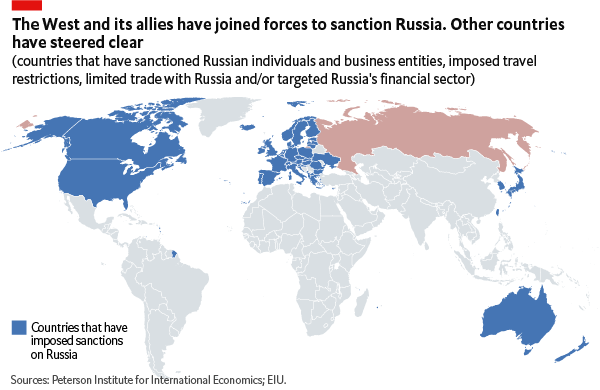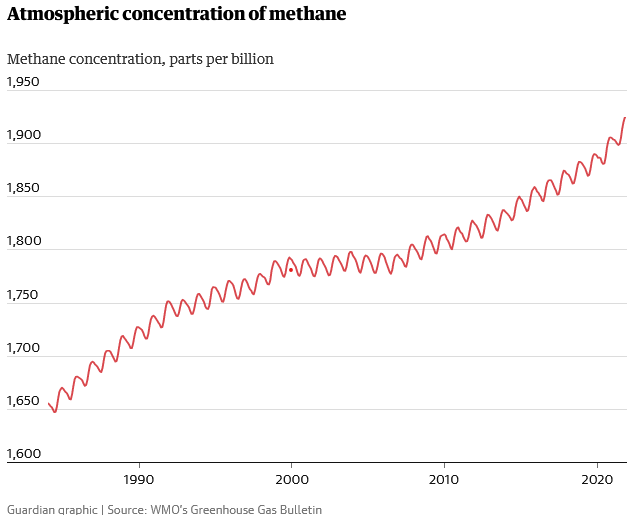I’ve said this for a while, but now we have empirical proof that most of the world likes Russia and China more than the US (h/t Johnstone):
“Among the 1.2bn people who inhabit the world’s liberal democracies, three-quarters (75%) now hold a negative view of China, and 87% a negative view of Russia,” the report reads. “However, for the 6.3bn people who live in the rest of the world, the picture is reversed. In these societies, 70% feel positively towards China, and 66% positively towards Russia.”
However, across a vast span of countries stretching from continental Eurasia to the north and west of Africa, we find the opposite – societies that have moved closer to China and Russia over the course of the last decade. As a result, China and Russia are now narrowly ahead of the United States in their popularity among developing countries.
While the war in Ukraine has accentuated this divide, it has been a decade in the making. As a result, the world is torn between two opposing clusters: a maritime alliance of democracies, led by the United States; and a Eurasian bloc of illiberal or autocratic states, centred upon Russia and China.
Now, what they’re saying without quite saying it is that the Ukraine war correlated with even better public opinion towards Russia and China.
I find the next chunk predictable:
However, what matters may not be so much the presence of democratic institutions, but
rather, whether they are valued and appreciated by citizens. If so, attitudes towardscountries such as Russia or the United States might take into account their potential to assist – or damage – the health of their democracy. For a closer look at Figure 20 reveals anumber of electoral democracies, such as Indonesia, India or Nigeria, in which the public remains sympathetic to Russian or Chinese influence, in spite of a difference in political regime. Thus it is not simply whether democratic institutions exist that countsbut rather, the degree to which they are seen as functional and legitimate.
This seems reasonable, at first glance. Here’s the chart:

Eyeball those nations above and below the 50% mark.
What does the grouping below 50% all have in common? What does the grouping above 50% have in common?
Whether or not they could be considered part of the Westerns sphere. Those above the line are generally not those who have done well under US hegemony and who are not Western allies.
So, yeah, this looks to me to be a case of “correlation is not causation”. I would gently suggest that what creates the legitimacy of “democratic institutions” is whether they have delivered for people and that those countries under 50% tend to be those who have been inside the Western (US/EU/close allies bubble.)
So, yes, it is actually about the new cold war.
Now remember, China now does most of the world’s development. It isn’t even close. They build the new ports, airports, hospitals, roads, bridges and even cities. Further, they do it cheaper than the West does it.
So, if you’re a developing nation who isn’t inside the “blessed bubble”, even as bad as that bubble has become under neoliberalism, China looks good and America looks… well, not so good, especially since the US has been the primary driver of trade and finance rules which have been very bad for the third world.
This has been going on for a long time, but since the collapse the USSR there hasn’t been another option. China offers one, and Russia is thumbing its nose at a global order that has gone out of its way to screw over the countries which are above that 50% line.
So, I wouldn’t say it’s exactly about “democratic legitimacy” — that legitimacy is a dependent variable and it is associated with America, NATO and to a lesser extent the EU. When a global regime doesn’t deliver it is discredited, and in fact even in countries under the 50% mark, most have been losing trust in “democratic legitimacy” as well. Americans and British will know well of what I speak.
The end result is that most of the world now slightly favors China and Russia and the important part is that trend is likely to continue. There will be a cold war, and most of the world wants to remain neutral or slightly favors China/Russia. On election Lula in Brazil said they would keep trading with both sides and not be drawn into the cold war, but Brazil is one of the founding members of the BRICS (Brazil, Russia, India, China, South Africa) the most important economic bloc that doesn’t include the US. Brazil will remain “neutral” but 31% of Brazil’s exports now go to China and 11% to the US. If the US is stupid enough to push, and military might isn’t determinative, Brazil would be foolish not to go with China.
Power follows industrial capacity and popularity follows treatment. With a few notable exceptions, if you’re a third world country, China treats you better than the US has in ages. As for Russia, well, they may screw with nearby countries, but otherwise they don’t get involved much (remember Syria invited them in, and is a long time ally.) Indians, in particular, remember that Russia was a friend for generations when the US and Europe were not. As for Africa, China has been developing good relations thru trade and development for decades now.

In this cold war, the West is going to be the one isolated, as the above (older) map from the Economist suggests. Yes, they are “neutral” for now, but if forced to choose, don’t assume they’ll choose the current order.
The “rules based international order” is rather small and how it has been run has damaged democratic legitimacy far more than “China” or “Russia”.

